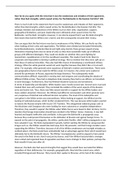How far do you agree with the view that it was the weaknesses and mistakes of their opponents,
rather than Red strengths, which caused victory for the Bolsheviks in the Russian Civil War? (20)
There is much truth to the statement that it was the weaknesses and mistakes of their opponents,
rather than Red strengths, which caused victory for the Bolsheviks in the Russian Civil War. The
strategic mistakes and weaknesses of the Whites such as their unity, organisation, support,
geographical limitations, and poor leadership were ultimately what caused victory for the
Bolsheviks, not the Reds’ strengths. However, it can also be argued that it was the Reds strengths
that meant they had the Whites over a barrel, and this consequently ensured their victory.
One can argue that the Red victory was due to weaknesses of the Whites. We can firstly see this
when looking at their unity and organisation. The Whites were divided and included Mensheviks,
Social Revolutionaries, moderate liberals and right-wing tsarists; these groups argued among
themselves meaning there was no sense of unity as they were essentially made up of different
groups with different ideologies. They could not decide on whether they were fighting for
monarchism, republicanism or for the constituent assembly. This made it hard to for them to
cooperate and impossible to develop a political strategy. Not to mention that they were split up on
their ideas of national minorities. They also had little chance of developing a coordinated military
strategy. Often the white generals would not work together because they didn’t like or trust each
other. For example, other generals were suspicious of Kolchak's motives and intentions. There were
also geographical factors that made the Whites weak, for instance, the armies were scattered
around the perimeters of Russia, separated by large distances. This subsequently made
communications difficult, especially in moving men and weapons and coordinating the attacks of
different White armies. They had no telephone links meaning they had to use officers on horseback
to send messages. Furthermore, they had limited industrial resources and armaments.
In terms of leadership and discipline, White leaders were mostly second rate. Several were cruel and
treated their men with contempt. They reminded the soldiers of the worst aspects of the Russian
army and tsarist rule. Thus, there was little natural warmth or support for the White leaders and
many soldiers deserted. Moreover, the Whites had different commanders and other generals were
very suspicious of Kolchak and suffered internal corruption. The level of this indiscipline and
corruption in the White armies was extraordinary. When looking at support, the Whites lost the
backing of nationalist groups, which further weakened them. This was because white leaders wanted
to restore the Russian empire with its pre-1917 borders. This antagonised national groups such as
the Ukrainians and Georgians who were looking for more autonomy or complete independence.
Therefore, they wouldn’t support the Whites when White forces were based in their territory. Not to
mention that foreign intervention should have worked in the Whites’ favour. However, it was half-
hearted and largely ineffective and unreliable. It also gave the Bolsheviks a propaganda coup
because they could present themselves as the defenders of Russian soil against foreign forces. To
expand on the point of propaganda, the whites, particularly Denikin, didn’t utilise propaganda or see
how valuable it was. The Reds manipulated it greatly, further tainting the Whites by using powerful
images such as; the Whites would take land away from the peasants, and that foreign invaders were
supporting the Whites. Therefore, because of all of the Whites weaknesses and outright mistakes as
outlined above, the Reds would have undoubtedly had an advantage against them which would have
ultimately led to the Bolshevik victory. The Whites’ incompetencies could be argued to have paved
the way for the Reds to win, that it was just by chance, and if the Whites had provided a stronger,
more united and organised base of opposition and been more strategic in their policies, perhaps the
Reds wouldn’t have won after all.
However, the Reds also had several strengths that suggest they would have overruled the Whites
regardless of their deficiencies. For example, geographically, they held the central area, which
included Petrograd and Moscow. They moved their capital to Moscow, at the hub of the railway




